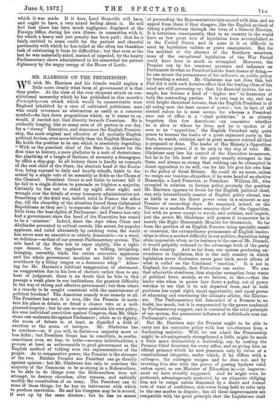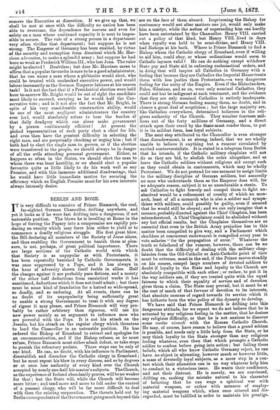MR. HARRISON ON THE PREMIERSHIP.
WE wish Mr. Harrison and his friends would explain a little more clearly what form of government it is that they prefer. At the close of the very eloquent attack on con- stitutional monarchy which he has published in this month's Fortnightly—an attack which would be unanswerable were England inhabited by a race of cultivated politicians, men who could reverence an abstraction as easily as a concrete symbol—he lays down propositions which, as it seems to us, would, if carried out, lead directly towards Cfflsarism. He is evidently longing, like so many men of all parties in our day, for a " strong " Executive, and denounces the English Premier- ship, the most original and effective of all specially English political devises, even more bitterly than the English Monarchy. He holds the position to be one which is absolutely degrading. "With us the practical chief of the State is, almost for the first time in history, a mere gladiator in a mob of rhetoricians, the plaything of a tangle of factions, of necessity a demagogue, by office a stop-gap. In all history there is hardly an example of the real chief of the State, the absolute head of the Execu- tive, being exposed to daily and hourly rebuffs, liable to dis- missal by a single vote of an assembly as fickle as the Chops of the Channel. President Grant is not liable to instant fall if he fail in a single division to persuade or frighten a majority. Certainly he has not to stand up night after night, and wrangle over the details of every trumpery administrative act. Something of the kind was, indeed, tried in France the other day, till the absurdity of the situation forced them (infatuated Republicans as they are !) to separate the chief of the State a little from the bear-fights of Parliament ; and France has only had a government since the head of the Executive has ceased to be a minister.' Indeed, since the days when Cleon and Alcibiades perorated to critical crowds, like actors, for popular applause, and ruled alternately by catching votes, the world has never seen an executive so utterly democratic—in a word, so delirious—as that of our present Parliamentary system. The sole head of the State has to caper nightly, like a tight- rope dancer, for the applause of a talking, intriguing, lounging, assembly, while the entire executive apparatus and the whole government machine are liable to instant overthrow by a biting tongue or a dexterous whip." Allow- ing for Mr. Harrison's habitual exaggeration of statement, an exaggeration due to his love of rhetoric rather than to any heat of judgment, there is no doubt that he hits in that passage a weak place in our institutions, the greatest difficulty in the way of strong and effective government; but then where is a remedy to be sought consistent with the maintenance of political freedom.? The American remedy is no remedy at all. The President has not, it is true, like the Premier to main- tain his place in debate, or dread a chance vote or a well- planned surprise ; but he can no more maintain his own policy, his own individual conviction against Congress, than Mr. Glad- stone can maintain his against Parliament ; while as to dignity, the arena of debate is, at least, as dignified a field of exertion as the arena of intrigue. Mr. Gladstone has to convince—or, if you will, to flatter—a majority more or less fickle ; but President Grant has to conciliate, to soothe, sometimes even, we fear, to bribe—seventy individualities, a process at least as unfavourable to good government as the English method of talking over the representatives of the people. As to comparative power, the Premier is the stronger of the two. Neither Premier nor President can go directly against opinion ; but Mr. Gladstone has only to convince the majority of the Commons to be as strong as a Hohenzollern, to be able to do things even the Hohenzollern dare not attempt, to destroy churches, alter tenures, and radically modify the constitution of an army. The President can do none of these things, for he has no instrument with which to produce conviction. He and his Congress may be in accord, if sent up by the same electors ; but he has no means of persuading the Representatives into accord with him, and no appeal from them if they disagree, like the English method of taking a plebiscitum through the form of a General Election.
It is notorious, consequently, that in no country in the world have so few great acts of legislation been accomplished as in the United States, and in none is it so difficult to meet by legislation sudden or grave emergencies. But for the accident of the absence of the Southern members, none of the exceptional legislation of the War Period could have been so much as attempted. Moreover, the Premier can by his constant presence and influence on Parliament do what no President has the least chance of doing,— he can secure the permanence of his influence on public policy by founding a school. Mr. Gladstone has not done this, but Peel did it with such decisive effect that the leading ideas of his mind are still governing us ; that his financial system, for ex- ample, has become a kind of "higher law" to financiers of both the contending parties. It is very easy to say, and say with bright rhetorical fervour, that the English President is of all ruling men the least secure of power ; but, in fact, of all elected rulers he is most secure, for whereas a President once out of office is a "dead politician," is so utterly forgotten that few Americans can remember whether he is alive or where he lives, and he is spoken of if seen as an "apparition," the English President only quits power to become the leader of a great organised party in the State, to watch, criticize, and in great measure control all that is proposed or done. The leader of Her Majesty's Opposition has enormous power, if it be only in the way of veto. Mr. Gladstone may lose his control of the Executive to-morrow, but he is for life head of the party usually strongest in the State, and always so strong that nothing can be attempted in direct opposition to its will, can for his life give his own bias to the policy of Great Britain. He could do no more, unless we resign our freedom altogether, if he were head of an elective Monarchy, a Lord Protector, or President. William III., who occupied in relation to foreign policy precisely the position Mr. Harrison appears to desire for the English political chief, was only intermittently master of English policy abroad, was as liable to see his direct power cease in a moment as any Premier of succeeding days. He remained, indeed, on the Throne as a modern Premier remains chief of the Opposition, but with no power except to watch, and criticize, and impede, just the power Mr. Gladstone will possess if to-morrow he is merely the Right Honourable Member for Greenwich. So far from the position of an English Premier being specially unsafe or uncertain, the extraordinary permanence of English leader- ships is often a marked difficulty in our politics, deposition being often impossible when, as for instance in the case of Mr. Disraeli, it would palpably redound to the advantage both of the party and the country. And so far from our system producing un- steadiness in legislation, this is the only country in which legislation never fluctuates, never goes back, never allows of what is called on the Continent "reaction." It is not in England, for example, that Protection can revive. We owe that admirable steadiness, that singular exemption from waste of political force, mainly, as we believe, to this,—that the leader who when in power lays down a policy, out of power watches to see that it be not departed from, and in both positions has equal right, equal opportunity, and equal power of educating and convincing the ultimate arbiter, the Elector- ate. The Parliamentary toil demanded of a Premier is, no doubt, too much, but it is compensated by the power conferred by Parliamentary support, and is essential to the vital principle of our system, the permanent influence of individuals over our Parliament's action.
But Mr. Harrison says the Premier ought to be able to carry out his executive policy with less interference from a fluctuating majority. Well, we can admit the Premiership might be advantageously strengthened a little, might be made a little more distinctively a leadership, say, by making the Premier Chief Secretary for every office, and so giving him an official primacy which he now possesses only by virtue of a constitutional etiquette, under which, if he differs with a colleague, the colleague resigns and he does not, and by investing him also with the power of passing byelaws valid unless upset, as our Minister of Education is,—an improve- ment we have steadily suggested. And he might even be protected, advantageously protected, by an etiquette obliging him not to resign unless dismissed by a direct and formal vote of want of confidence, side-votes being held to refer only to the one matter in dispute ; but all these improvements are compatible with the great principle that the Legislature shall remove the Executive at discretion. If we give up that, we shall be met at once with the difficulty no nation has been able to overcome, the dependence for success and even for 'safety on a man whose continued capacity it is next to impos- sible to secure. The rule of a strong person in a department 'very often vivifies that department; but suppose he is not strong. The Emperor of Germany has been enabled, by virtue of the security and exemption from dismissal which Mr. Har- rison advocates, to make a splendid army ; but suppose he had been as weak as Frederick William Ill., who lost Jena. The ruler might be elected ? Doubtless; but does Mr. Harrison mean to affirm that a popular favourite is sure to be a good administrator, that he can name a man whom a plebiscite would elect, who could he trusted with unchecked executive power, and would labour incessantly as the German Emperor labours at, his unseen task? Is it not the fact that if a Presidential election were held here to-morrow Mr. Bright would be out of sight the candidate most likely to succeed, carrying as he would half the Con- servative vote ; and is it not also the fact that Mr. Bright, in spite of his very considerable constructive ability, would be one of the most negligent administrators the country ever had, would absolutely refuse to bear the burden of that daily drudgery which can alone make government by a person continuously efficient ? At present the picked representatives of each party elect a chief for life, and even then have the greatest difficulty in selecting the right man, and are perpetually checking or urging him ; but if both had to elect the single man to govern, or if the election were transferred to the people, we should always be in danger of all the evils attending personal government. Either, as happens so often in the States, we should elect the man to whom there was least hostility, or we should elect a popular favourite quite as little likely to do his work well as any Premier, and with this immense additional disadvantage, that he would have little immediate motive for securing, the efficiency which an English Premier must for his own interests always intensely desire.



































 Previous page
Previous page